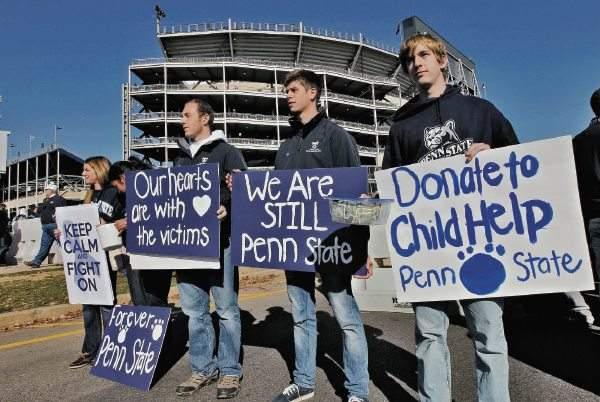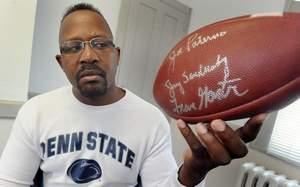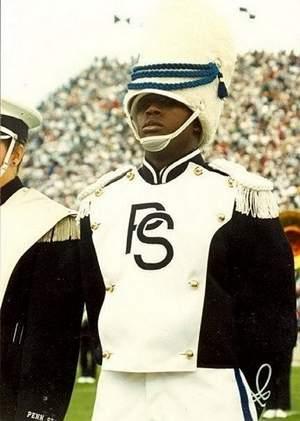By Beth Miller
News Journal
November 13, 2011
http://www.delawareonline.com/article/20111113/NEWS/111130336
 |
| A group of students at Penn State collect money for childhelpusa.org outside Beaver Stadium before the football game against Nebraska on Saturday in State College, Pa. Others have used social media to rally support for the nonprofit RAINN (Rape Abuse Incest National Network). As of Saturday night, the rally for RAINN had helped raise about $300,000. / AP/ALEX BRANDON |
 |
| Former Penn State marching band drum major Mike Harrell, who lives in Smyrna, holds a football that was given to him from a friend on the team after it was signed by coaches Joe Paterno, Jerry Sandusky and Fran Ganter. / THE NEWS JOURNAL/GARY EMEIGH |
 |
| Mike Harrell was the first black drum major of the PSU marching band. / COURTESY OF MIKE HARRELL |
The horrific allegations of child sexual abuse by a longtime Penn State University coach humbled the school's proud empire and raised again the most disturbing questions of all: Where else are kids being abused, and who else is keeping those crimes a secret?
The same questions have haunted members of the Roman Catholic Church over the past decade, as that institution wrestled publicly with its private crimes and silences.
But with the Catholic Church's public agony such a fresh memory, how did a constellation of respected Penn State leaders -- including the university's now-dismissed President Graham Spanier, Hall of Fame football coach Joe Paterno and two other officials now facing perjury charges -- miss the excruciating implications of the allegations against their colleague, Jerry Sandusky, and leave those matters unaddressed for more than a decade?
Only the subpoena power of a Pennsylvania grand jury was able to wrest long-buried information from insiders -- including an assistant coach who said he told Paterno he saw Sandusky rape a 10-year-old boy in the Penn State showers -- and produce multiple charges of "involuntary deviant sexual intercourse" with boys, charges Sandusky has denied through his attorney.
"The worst thing about this is that it raises the possibility that the church disease and complicity is widespread," said Jay Belsky, who was a professor of human development at Penn State for 21 years and now holds a similar position at the University of California-Davis. "If the Paternos and Spaniers of the world are doing what the priests and bishops did, what's going on at so many other institutions? Maybe the Catholic Church is just the tip of the iceberg, and Penn State is just another tip."
The parallels are chilling, and, former Minnesota prosecutor Victor Vieth says, 20 years of research suggests it is "commonplace."
"The failure of multiple, well-educated professionals at Penn State to report abuse is not an isolated instance," said Vieth, now director of the National Child Protection Training Center. "It is the norm."
But it may produce a tipping point, some believe, for those who struggle to strengthen protections for children -- even as the 2006 arrest of former Diocese of Wilmington priest Francis DeLuca prompted the late Bishop Michael Saltarelli to publish the names of other priests against whom credible allegations had been made.
"The situation at Penn State may end as another disaster, or it could mark the beginning of widespread understanding that contributing members of society do sexually abuse children," said Jane Gilgun, a professor in the University of Minnesota's School of Social Work. "Maybe the era of sacrificing children for the sake of institutional reputations is over now, too."
Charles F. Gallagher III, who was senior prosecutor of the 2005 grand jury inquiry into clergy sexual abuse and concealment of the crimes in the Archdiocese of Philadelphia, hopes it will push lawmakers to consider proposals similar to Delaware's 2007 Child Victims Act. That legislation opened a two-year window during which abuse survivors could file civil suits for claims that otherwise would have been barred by the statute of limitations. The Catholic Diocese of Wilmington recently emerged from Chapter 11 bankruptcy after settling claims from 150 survivors.
Gallagher also believes there should be no statute of limitations -- criminal or civil -- in cases of child sexual abuse.
"I think this horrendous happening in Happy Valley raises the consciousness of everyone in Pennsylvania that we have to be alert about child sexual abuse," Gallagher said. "We knew this was not only done by priests -- but also by coaches, by uncles, by fathers. ... There is no statute of limitations for murder. There should be no statute of limitations for soul murder."
Scandal angers alumni
The grief and betrayal felt by many in the Penn State community is the same felt by the Catholic faithful when scores of once-trusted priests wound up listed as child abusers.
The graphic details in the Pennsylvania grand jury's report on Sandusky, Paterno's longtime defensive coordinator, echo those recorded in court documents filed by the 150 abuse survivors who sued the Catholic Diocese of Wilmington and religious orders in Delaware from 2007 to 2009.
And some wearing Penn State blue and white already have felt the scorn of strangers, as those wearing the priestly collar surely have over the years.
Mike Harrell, of Smyrna, can speak to that.
Harrell is no pedestrian Penn Stater. In 1990, he became the first black drum major of its famous marching band. He knows what it's like to run onto the field at Beaver Stadium with 100,000 fans cheering, and, at 41, he can still do the drum major's signature "flip," which leads the band into action and kicks off Penn State football events.
He has tasted the glory up close and personal.
Last week was different.
He stopped at a Wawa, and one of the other customers saw his Penn State sweatshirt.
"You should be ashamed," the person said to him.
No way, Harrell says. He is angry about the abuse and grieving the loss of innocence.
"It's incredibly painful," he said. "It's shocking. It's difficult to explain to someone who is not part of the organization. ... It angers a lot of us to a great degree, and anyone with an ounce of humanity should be angry."
But he won't be ashamed of an institution that prepared him for life and provided a network of enduring friendships.
"I'm still proud of Penn State," said Harrell, now deputy director of the state's Division of Motor Vehicles. "I'm going to participate and cheer on the various athletic teams. There's real loyalty for us. When we sing the alma mater, we mean it."
A swirl of mixed emotions engulfed students and alumni as developments emerged last week.
They saw video of Sandusky in handcuffs and heard that the president of their university had been fired and two other top officials removed.
When the ax reached Paterno, a beloved and vigorous 84-year-old nearing a long-deferred retirement, students brought their emotions into the streets of State College. For some, those protests sent a message that football -- not the safety of children -- was the highest value.
Others have taken a decidedly different tack, using social media to rally support for the nonprofit RAINN (Rape Abuse Incest National Network). On the website explaining the campaign, the four organizers -- Jerry and Jaime Needel, Bob Troia and Larena Lettow, all of the Class of 1998 -- said they had a goal to raise $500,000, about $1 from each of Penn State's alumni.
"Penn State is way bigger than the alleged actions of a few people," they wrote. " ... Please join us in showing the world what being a proud supporter of Penn State really means by making a donation in support of preventing and treating victims of sexual abuse and by adding your name to mine below."
By Saturday night, the total had reached about $300,000.
Something profound was lost this week, though, Harrell said.
"It's not appropriate to say that it feels like the death of a loved one, but whether it's appropriate or not, that's kind of how it feels."
Accountability still key
The eight boys whose stories were told in the Pennsylvania grand jury's report now live with an agony survivors find difficult to shed -- even when their claims are taken seriously and decades have passed.
"It's still a challenge every day," said Matthias Conaty, 43, who was abused from 1978 to 1982 by a Capuchin friar who was the chaplain at St. Edmond's Academy.
Conaty, who works in marketing for The News Journal, now sees it as a personal mission to work for reforms he believes will protect children from abuse. He was a lead advocate for the 2007 Delaware law, was co-chairman of the committee that represented abuse survivors during the diocese's bankruptcy case and continues to serve on the boards of two national child protection groups.
Still, he said, "I feel broken, that something is wrong with me. Objectively, I know that's not true, but I still have the feelings."
He hopes the national attention Penn State now brings to the crime of child abuse -- and the additional wrong of not reporting it -- will make a difference for future generations.
"Removing the current boss doesn't change the culture," Conaty said. "But I think the tide is actually shifting. There is a grass-roots movement, and it's one of the main voices here -- the survivors. That's a real shift. It used to be you were living in silence, shame and pain. As people like me are empowered by things like the civil window, it changes the playing field and lets us speak and be witnesses to the truth."
Vieth said Penn State is the "poster child" for research that shows that most people won't report child sexual abuse, even when they have clear evidence that it is happening. His training center offers federally funded programs and curriculum for college students and professionals. Wilmington University has added a certificate program to its offerings, and many in state and county agencies also have been trained, Vieth said.
Better training is key to better reporting.
Those in authority who treat such crimes lightly should take special note of the fate of Spanier and Paterno, Minnesota's Gilgun said. Penn State's board of trustees did exactly the right thing, she said.
"Their goal was not to hurt kids," she said. "But they had a moral blind spot -- both of them did. Just as the bishops and archbishops and, I think, the present pope did. Something was at stake for them, and they overlooked the children."
The Penn State board made a difference no one in the Catholic Church could match, said Marci Hamilton, a New York-based attorney who specializes in constitutional law, has worked on many abuse cases and is part of a case pending against the Vatican. Hamilton earned two master's degrees at Penn State and was among those who testified in support of Delaware's Child Victims Act.
"As sad as it is, the board did exactly what needed to be done," Hamilton said. "They sent the loudest message possible that it doesn't matter who you are -- if you are putting children in unnecessary risk, you're going to take a fall."
By contrast, she said, former Boston Archbishop Bernard Law "could run off to the Vatican. Paterno and Spanier had no place to hide. They are accountable to taxpayers and what the legislators demand. There are all these layers of accountability that they could not avoid."
California's Belsky remains baffled by the long silence of so many -- and it makes him worry about the future.
"There were no heroes here," he said. "No one who said, 'To hell with my reputation, my job, who you guys are. I'm going to open my big fat mouth.' How many people had some inkling of this, and none of them stepped up to the plate? ... There was nobody here that said, 'Silence is a crime, and I'm not going to stand for it.' "
He fears the power of such silence.
"Everybody you see on TV who's upset, their claim is, 'I never would have done that.' But the weird question is -- is that really so?" he said. "All those people in the church did it. Some group of people at Penn State did it.
"It makes me wonder if this conspiracy of silence is widespread."
Contact: bmiller@delawareonline.com
Any original material on these pages is copyright © BishopAccountability.org 2004. Reproduce freely with attribution.